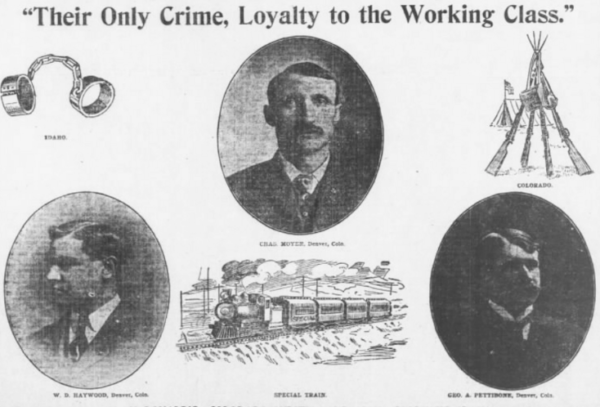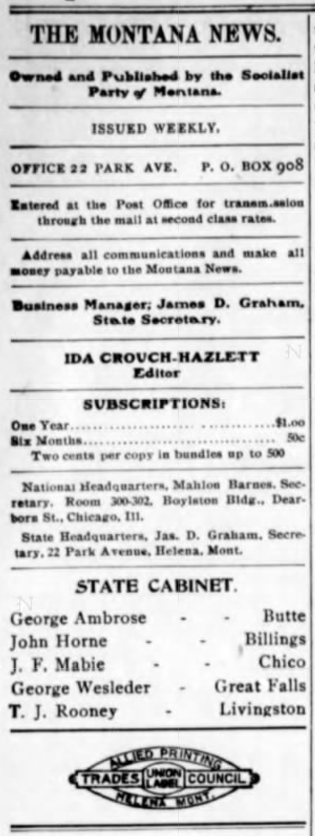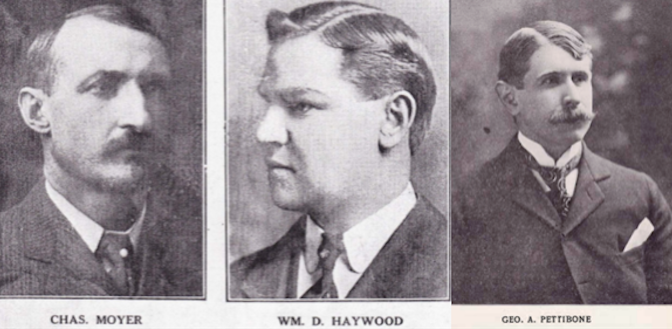There are no limits to which
powers of privilege will not go
to keep the workers in slavery.
-Mother Jones
Hellraisers Journal, Saturday December 8, 1906
U. S. Supreme Court Rules in Favor of State-Sponsored Kidnapping

The U. S. Supreme Court has ruled that kidnapping is legal as long as it is accomplished by the Governor of a state, or, as in the case of the kidnapping of Haywood, Moyer and Pettibone, done through a conspiracy between the Governors of two states: Colorado and Idaho. The lone voice for actual “law and order” upon the Court was that of Justice McKenna whose dissenting opinion states in part:
Kidnapping is a crime, pure and simple. It is difficult to accomplish; hazardous at every step. All the officers of the law are supposed to be on guard against it. All of the officers of the law may be invoked against it. But how is it when the law becomes the kidnapper?
When the officers of the law, using its forms and exerting its power, become abductors? This is not a distinction without a difference—another form of the crime of kidnapping distinguished only from that committed by an individual by circumstances. If a state may say to one within her borders and upon whom her process is served, I will not inquire how you came here; I must execute my laws and remit you to proceedings against those who have wronged you, may she so plead against her own offenses? May she claim that by mere physical presence within her borders an accused person is within her jurisdiction denuded of his constitutional rights, though he has been brought there by her violence?
[…..]
No individual could have accomplished what the power of the two states accomplished. No individual or individuals could have commanded the means and success could have made two arrests of prominent citizens by invading their homes; could have commanded the resources of jails, armed guards and special trains; could have successfully timed all acts to prevent inquiry and judicial interference. The accused, as soon as he could have done so, submitted his rights to the consideration of the courts. He could not have done so in Colorado. He could not have done so on the way from Colorado. At the first instant that the state of Idaho relaxed its restraining power he invoked the aid of habeas corpus successively of the Supreme Court of the state and of the Circuit Court of the United States. He should not have been dismissed from court, and the action of the Circuit Court in so doing should be reversed.
From the Montana News of December 6, 1906:
Merciless Capitalists
—–Supreme Court Declares Against
Moyer and Haywood
in Habeas Corpus Appeal.
The expected has happened. A servile supreme court has denied to the Western Federation officials the ancient right of habeas corpus. This decision is all the more heinous in that the court had previously admitted all the points in regard to the illegality in the method by which the men were taken out of Colorado into Idaho territory. But what else can be expected from a judicial institution, based upon the capitalist system of robbing and despoiling the producer. The whole national court system is based upon the deliberate plan of being the final inexorable power to keep the workers in subjection if they ever rebel from conditions favorable to capitalist accumulation. That is what a capitalist court is there for.
Moyer, Haywood, and Pettibone, perfectly innocent men, have been lying in jail without trial for a year. The court could have decided immediately, but it wouldn’t do it. The courts are helping mine owners to break up the Western Federation of Miners. And if there could be any burlesque to a conspiracy so ghastly, it is found in the fact that the rank and file of the Western Federation, the miners of Colorado, never voted for their imprisoned comrade at all. The brutal overriding of the capitalists is equaled by the infinite stupidity of their working men.
Let the merry game go on-brutal butchers, capitalist hangmen-bullpens, military force, card systems, shattered unions-all the trappings and the suits of oppression-and let the ignorant and subordinate workers push their own death cart to the scaffold. They’ll get plenty of what they’re voting for if they’ll just keep it up.
———-
[Photograph added.]
From The Washington Post of December 4, 1906:
MINERS ORDERED HELD
—–Moyer, Haywood, and Pettibone
Refused Habeas Corpus.
—–
SUPREME COURT SO DECIDES
—–
Justice Harlan Decides Manner in Which Men
Held for Complicity in Murder of Former Gov.
Steunenberg Were Carried from Colorado
to Idaho Is of No Consequence-
State Courts May Try.
—–
The United States Supreme Court yesterday decided adversely to the men in prison the habeas corpus cases of Moyer, Haywood, and Pettibone, the representatives of the Western Federation of Miners, who are held in Idaho on the charge of complicity in the murder of former Gov. Steunenberg. The decision will continue the men in confinement for trial in Idaho.
The opinion was by Justice Harlan.
Of the men involved, Charles H. Moyer is president. W. D. Haywood, secretary-treasurer, and George A Pettibone, a member of the Western Federation of Miners. They are now in prison in Canyon County [Ada County], Idaho, under a charge of murdering former Gov. Steunenberg, of that State, although it was not charged that they were present when the crime was committed.
Question of Jurisdiction.
The cases came to the Supreme Court on an appeal from a decision of the Idaho Federal court, refusing to grant writs of habeas corpus. The principal point of controversy was the method by which the Idaho authorities secured jurisdiction over the men.
All of them are residents of Colorado, and it was alleged on behalf of Moyer and his associates that they were kidnapped, in pursuance of a conspiracy, to which the governor of Colorado and the Idaho authorities were parties, and hence, that jurisdiction was acquired by fraud.
Justice Harlan said that in habeas corpus proceedings in the United States courts the method of the extradition of the defendants is not material. The merits of the cases were not involved, as that phase was not presented.
Right of State Courts.
The only question involved was the right of the State courts to proceed with the cases, of which there could be no doubt.
Justice McKenna delivered a dissenting opinion holding that Moyer, Haywood, and Pettibone had a right to invoke the aid of the Federal courts to correct improper methods used in securing their extradition. He said that kidnapping under the law is no more to be justified than when performed outside the law, where every effort of authority is used to prevent and punish it.
[Justice Harlan concluded:]
Any investigation as to the motives which induced action by the governors of Idaho and Colorado would be improper, as well as irrelevant, to the real question to be now determined. It must be conclusively presumed that those officers proceeded throughout this affair with no evil purpose and with no other motive than to enforce the law.
———-
[Photograph added.]
SOURCES
The Cripple Creek Strike
-by Emma Florence Langdon
Denver, Colorado
(this edition with appendix
must be about 1908)
http://www.rebelgraphics.org/wfmhall/langdon00.html
McKenna’s Dissenting Opinion
http://www.rebelgraphics.org/wfmhall/langdon29.html#mckennasdissentingopinion
Montana News
(Helena, Montana)
-Dec 6, 1906
https://www.newspapers.com/image/77935394/
The Washington Post
(Washington, District of Columbia)
-Dec 4, 1906
https://www.newspapers.com/image/31595909/
IMAGES
Kidnappers Special by BBH, AtR, May 19, 1906
https://www.newspapers.com/image/66994051/
Montana News, MT SP, ED Ida Crouch-Hazlett, Dec 6, 1906
https://www.newspapers.com/image/77935401
HMP, Moyer Haywood Pettibone, ab 1906
pdf! http://darrow.law.umn.edu/documents/Wilshire_Mag.pdf
http://darrow.law.umn.edu/photo.php?pid=777
See also:
Pettibone v. Nichols, 203 U.S. 192 (1906)
http://darrow.law.umn.edu/trials.php?tid=3
Very controversial U.S. Supreme Court decision involving the appeal of the arrest and extradition to Idaho of Haywood, Moyer, and Pettibone for the murder of Frank Steunenberg. The question of kidnapping was carried to the Supreme Court of the United States, which said that, while the taking was illegal, the defendants were in Idaho, and the court would not inquire into how they arrived in that jurisdiction. Clarence Darrow, The Story of My Life. Darrow argued the Pettibone case before the Supreme Court along with Edmund F. Richardson and John H. Murphy. Jasper Nichols was the sheriff of Canyon County, Idaho. Arguing on behalf of Nichols was James H. Hawley and William E. Borah. Darrow did not actually go to Idaho until after the Pettibone decision.
*Note: by the time of the December 3rd ruling, the three men were confined in the Ada County Jail.
Pettibone v Nichols pdf
See page 217 for “Mr. Justice McKenna dissenting.”
Note: This ruling covered Haywood and Moyer as well.
-Moyer v Nichols is on page 221.
-Haywood v Nichols is the short note on page 222 which follows the Moyer ruling.
http://darrow.law.umn.edu/documents/Pettibone%20v%20Nichols.pdf
Hellraisers Journal: Darrow Appears Before U. S. Supreme Court on Behalf of Moyer, Haywood, and Pettibone
https://weneverforget.org/hellraisers-journal-darrow-appears-before-u-s-supreme-court-on-behalf-of-moyer-haywood-and-pettibone/
Tag: Haywood-Moyer-Pettibone Case
https://weneverforget.org/tag/haywood-moyer-pettibone-case/


